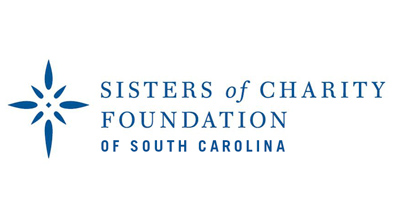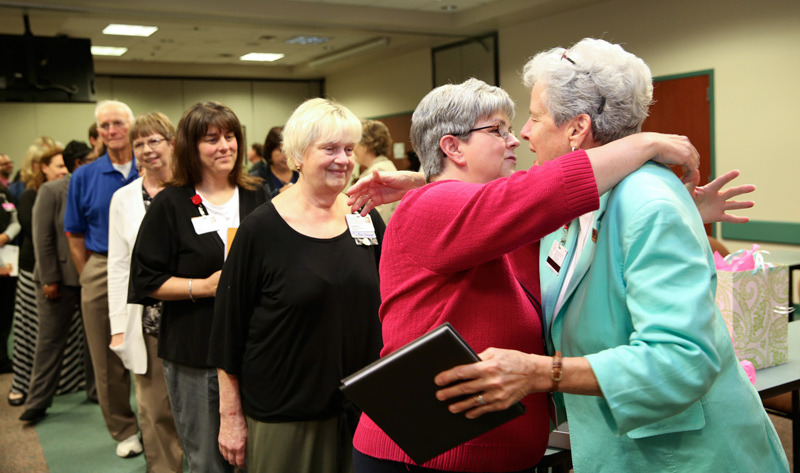
The Sisters of Charity Foundation of South Carolina recently awarded Community Enrichment grants for the fall 2016 grant cycle. These grants are awarded to organizations whose services go beyond meeting basic needs and will help lift people out of poverty.
Community Enrichment grants fund projects and organizations who are implementing best practices, strategic collaborations, and focus on both the immediate and long term needs of individuals and families living in poverty in South Carolina. In all, 15 organizations were awarded funding for a total of $202,000 so they may continue providing services to break the cycle of poverty. The foundation is proud to announce their partnerships with the following recipients:
The Alston Wilkes Society (AWS): Support for Trident Community Service Program which targets two very under-served, vulnerable and poverty-stricken populations: former offenders being released from prison and the homeless. AWS first addresses the basic and emergency needs of former offenders and other homeless populations and then offers assistance in finding and maintaining stability. Berkeley, Charleston and Dorchester Counties.
Children’s Advocacy Center, Dorchester Children’s Center (DCC): Support for its child-friendly, child-focused center that offers programs to aid in the investigation, prosecution and treatment of child abuse and neglect. DCC provides all children living in poverty and residing in Dorchester, Berkeley and a small portion of Charleston County free access to evidenced-based trauma treatment. Berkeley, Charleston and Dorchester Counties.
City Year’s Whole School Whole Child: A comprehensive school-support model that provides additional people-power in under-resourced schools, and offers struggling students additional academic tutoring and social-emotional skill development and behavior coaching which helps students stay in school and graduate with the skills to obtain a life-sustaining job. Lexington and Richland Counties.
CommunityWorks: Provides access to financial coaching, products, and services to low-wealth individuals to help ensure they are on the path toward financial stability. In response to a growing community need for safe financial products and services, CommunityWorks created GOALS: Gaining Opportunity to Assets, Loans, and Savings Program to help equip low-wealth families with the knowledge and tools necessary to become financially stable. Anderson, Greenville and Spartanburg Counties.
Compass of Carolina: Through the Domestic Violence Starts Small program, this organization provides free therapy hours for children/adolescents victimized by witnessing domestic violence in their home. Therapeutic intervention seeks to reduce the long- term consequences of trauma, thus putting an end to the cycle of violence and poverty. Greenville County.
Engaging Creative Minds (ECM): To expand the Summer STEAM (Science, Technology, Engineering, Arts, and Math) Institute to more schools in Clarendon and Berkeley counties. The program exists to help prevent summer learning loss. Evidence shows that preventing summer learning loss closes the opportunity gap which has been proven to close the achievement gap. Berkeley, Charleston and Dorchester Counties.
Foothills Family Resources (FFR): The organization’s Integrated Services Program (ISP), and the Center for Working Families (CWF) that functions within it, is designed to follow traditional crisis services with empowering programming which leads to career development and financial security. Foothills Family Resources provides their comprehensive services the Slater Marietta Community in Greenville County. Greenville County.
Helping Hands of Georgetown: While caring for the immediate needs of those in poverty, Helping Hands is equally committed to empowering individuals and families to move out of poverty through the Time to Change program. This collaborative endeavor offers an intensive job readiness and placement component and a weekly Life Skills program providing support and investment in those who are able and committed to become independent. Georgetown County.
Mental Health America Aiken’s Nurture Home: A shared-house shelter program with capacity for five families, designed to restore the hope of women and children who are homeless. The foundation of the program is the provision of an individualized approach to homeless women who are admitted into Nurture Home. South Carolina.
Sea Haven: Transitional Independent Program and Street Outreach Program provide outreach services in order to connect with struggling, homeless, near homeless at-risk youth on the streets. Youth are assisted in the areas of permanency, self-sufficiency, safety, connections with caring adults, and positive well-being. This grant will provide financial assistance to youth graduates to help meet the initial moving-in costs of security and utility deposits of permanent housing. Horry County.
Sustainability Institute: Support for the Energy Conservation Corps (ECC) program, which addresses two critical needs in the Charleston metro area: rehabilitation of existing, low-income homes and skilled workforce training. The home rehabilitation component utilizes a dual focus on direct energy efficiency upgrades and homeowner empowerment in order to significantly reduce unaffordable energy costs for families. Charleston County.
United Way of Kershaw County: Provides an avenue for homeless individuals and families to access transitional houses that will be a brief respite and safe haven. UW of Kershaw County’s past success rate in moving individuals and families from homelessness to permanent housing has been over 90% and success at helping them achieve a better financial standing from move in to move out has been over 80%. Kershaw County.
University of South Carolina Education Foundation: USC Salkehatchie Rural Nursing Initiative is a model partnership program with the USC College of Nursing, whose purpose is to “grow our own” nurses by offering place-bound students from the rural Salkehatchie region and surrounding areas an opportunity to earn a Bachelor of Science Degree in Nursing (BSN). With direct access to simulation, clinical time can be facilitated in a realistic and safe learning environment, providing exposure to clinical scenarios students will experience in the hospital setting. This simulation program will also reduce the travel burden on students who currently have to travel 180 miles round trip for clinical courses. Allendale, Bamberg, Barnwell, Colleton, Hampton and Jasper Counties.
Vital Connections of the Midlands: Serves 114 infants, toddlers and preschoolers in three child-development centers located in low-income neighborhoods: Children’s Garden, Arthurtown, and Tender Years. Those served are children who live in poverty, children who are homeless, children in foster care, and children who have special needs. These programs allow children to be cared for in a loving, educational environment while also allowing parents to be gainfully employed and reduce the financial burden of quality child care. Richland County.
Work In Progress, Inc.: Provides employment specialists that assist persons with a diagnosis of mental illness with obtaining competitive employment. The key component is the employment specialist, who provides assistance with professional resumes, job development, hands-on job coaching at the job site, and follow along supportive services for the duration of the employment opportunity. Richland and Lexington Counties.
The Sisters of Charity Foundation of South Carolina, established in 1996, is a ministry of the Sisters of Charity Health System. The foundation is committed to addressing the needs of the poor and underserved in all 46 South Carolina counties, and strategically uses resources to reduce poverty through action, advocacy and leadership.



